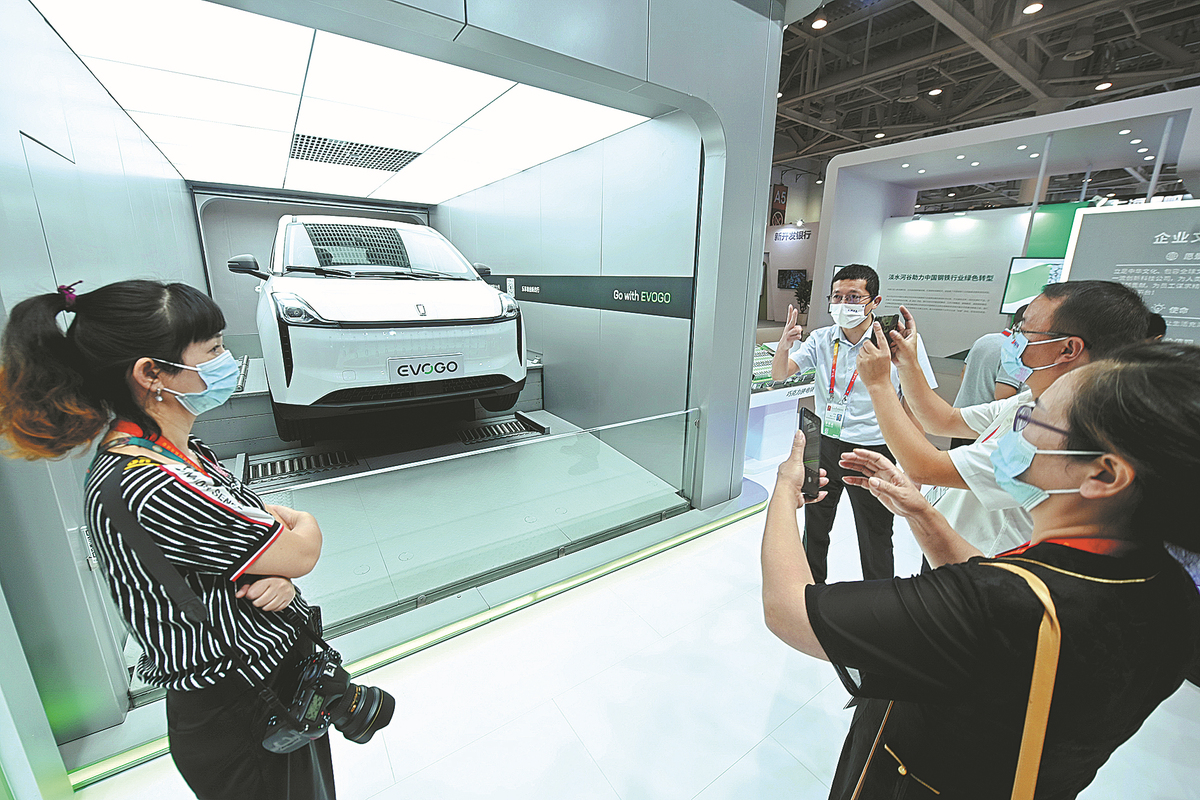
Visitors learn about new energy vehicles’ battery-changing process at the booth of Contemporary Amperex Technology Co Ltd during an expo in Xiamen, Fujian province, in September. [Photo/Xinhua]
Going global will be a key phrase for Chinese battery maker Contemporary Amperex Technology Co Ltd in 2023, as the world’s largest maker of electric vehicle batteries has accelerated its overseas expansion over the past year, according to company executives and industry experts.
Despite the unstable global supply chain due to the COVID-19 pandemic, CATL announced in late December that it had achieved mass production of lithium-ion battery cells as scheduled at its factory in the German state of Thuringia.
“We are now making every effort to ramp up the factory’s production capacity, which will also be our top priority for next year (2023),” said Matthias Zentgraf, CATL’s president for Europe.
The new plant, CATL’s first factory outside China, has a total investment of 1.8 billion euros ($1.91 billion), which is much higher than the average 300 million yuan ($43.6 million) to 400 million yuan investment in the company’s domestic factories. Notably, the new plant is only about a three-hour drive from Tesla’s Gigafactory Berlin-Brandenburg.
Germany’s BMW Group also announced back in 2019 the purchase of batteries from CATL worth 7.3 billion euros.
“Recent moves show CATL’s ambitious plan and accelerated steps for its capacity expansion in overseas markets to get closer with major car manufacturers to reduce costs in logistics amid COVID-19 pandemic uncertainties,” said Wang Jing, a research supervisor for high-end manufacturing at Shanghai Chaos Investment Group Co Ltd.
“With an anticipated boom in NEV sales globally in the coming years, mainstream battery manufacturers will no doubt rev up steps in going global,” she said.
Bloomberg reported last month that CATL and Ford Motor Co are considering building a battery manufacturing plant in Michigan, the United States, with a multibillion-dollar investment.
In August, the battery giant invested 7.34 billion euros in building a 100 gigawatt-hour battery plant in Debrecen, Hungary. Covering an area of 221 hectares in the Southern Industrial Park of Debrecen, the project will supply both cells and modules to European automakers.
“There is no doubt that our plant in Debrecen will enable us to further sharpen our competitive edge, better respond to our European customers and accelerate the transition to e-mobility in Europe,” said Robin Zeng Yuqun, founder and chairman of CATL.
In addition to Europe, the Ningde, Fujian province-based company is contemplating an investment of as much as $5 billion in a new plant in Mexico and is considering at least two locations in Mexico for a manufacturing facility to potentially supply to Tesla and Ford Motor.
In June, it also confirmed to China Daily that it had supplied electric vehicle batteries to South Korea’s Kia Corp, which marked the first entry of a non-South Korean battery maker into the market.
Market consultancy SNE Research said CATL’s market share in the global EV battery market reached 34.8 percent in the first half of last year, extending its lead with a 6.2 percentage point increase from a year ago.
According to minutes of an internal meeting provided to China Daily, Zeng told over 50 investors — including Hillhouse Capital Group, Sequoia Capital, Tencent Holdings and Temasek Holdings — that the company is also exploring the feasibility of localizing in the US.
Zeng said the company has had plenty of interaction with US clients, including both traditional automakers and electric vehicle manufacturers, and has explored with them the feasibility of supplies and cooperation, depending on product quality and costs that are to be reflected by worker training, efficiency and labor unions.
With over 10 production bases by the end of 2020, CATL plans to boost the expansion of overseas bases as well as system construction, including the training of overseas employees, he said.
“CATL’s performance beat market expectations. With fewer COVID-19 disruptions expected in the future and sales of new energy vehicles entering peak season, the company’s sales are expected to maintain continuous growth,” said an analyst team led by Yin Zhongshu from Everbright Securities.
Lin Boqiang, dean of the China Energy Strategy Research Institute of Xiamen University, said: “At present, China has its advantages and competitive edges globally in terms of lithium-ion batteries. With the country’s carbon neutrality efforts, China will surely stand at the forefront of the global power battery competition.”
